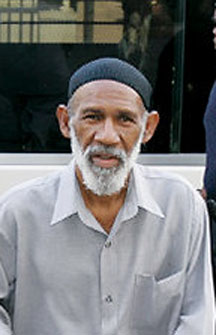(Trinidad Guardian) The State is moving to deem a Trinidadian convicted in the United States a terrorist and obtain a freezing order of his assets and any transaction done on his behalf.
The unprecedented action against convicted JFK bomb plotter Kareem Ibrahim, which is being pursued under the Anti-Terrorism Act, follows the collaborative efforts of local and foreign law enforcement and intelligence agencies.
The ex parte application was filed yesterday by the Office of the Attorney General and listed attorneys Pamela Elder, SC, and Michael Rooplal as the advocates.
No date has been set for the hearing.
The application comes on the heels of numerous reports of Trinidadians’ involvement with the Islamic State of Iraq and Syria (ISIS) and a fresh wave of calls for action to be taken against the foreign terrorist fighters in the wake of the recent ISIS attack in Paris.
News of the move had been announced hours earlier by Attorney General Faris Al-Rawi during a media conference following the opening session of the Caribbean Action Financial Task Force (CFATF) plenary meeting at the Hyatt Regency, Port-of-Spain, where a prayer was said in French and a minute’s silence was observed for the victims of the Paris attacks.
Al-Rawi declined then to name the person or entity but cited Sec 22 (B), 1 (B) of the Anti Terrorism Act as the piece of legislation which enabled him to act on the application.
Confirming that the application related specifically to terrorism, Al-Rawi said: “As incoming AG I met an application which was languishing and in respect of which there had been a conviction.
“I saw it as an important deliverable to proceed with that application to court and so I took the exercise of gelling the application into its proper form, ensured the evidence was behind the application and in very short measure made the approach to court today.”

A tough-talking Al-Rawi added: “Matters cannot afford to be in the system for long. You must deal with them conclusively and if you can’t deal with them, you have to say why.”
Warning that there would be international and local repercussions, Al-Rawi also declined to comment on the value of the assets involved, saying it would be premature to do so “until we have dealt with the position.”
Referring to pre-trial publicity and due process, the AG said every aspect of the law had to be carefully factored in for that instance.
He said his ministry, along with the Ministry of National Security, was urgently addressing issues, such as terrorist financing and foreign terrorist fighters, and they would soon make a public statement on the legislative changes that were being considered.
On the issue of the designation of foreign terrorist fighters and how the authorities can treat with it nationally, the AG said it was an international law issue and that talks were being held on whether one was allowed to bar the entry of alleged foreign terrorist fighters.
Claiming such a move would lead to the creation of statelessness, Al-Rawi said it was important to have the proper evidence of foreign travel, such as dates of entry, participation and departure from the host country.
He said if it was not specific, there may be circumstantial evidence one could use to one’s advantage.
“If you bar people from entering your country, as is being proposed by some jurisdictions, you have to make sure those entities that have been bounced from your borders go somewhere and are treated somewhere. Who treats with statelessness?” he asked.
Al-Rawi acknowledged that the rights enshrined in the T&T Constitution, as well as the Treaty of Caricom and the International Court of Human Rights, provided an avenue for those people to seek redress both locally and internationally.
“Our jails are made to be used after due process has been carried out, so we don’t necessarily share the view that one ought to bounce somebody at the airport. What you really want to do is treat with the criminality in your due process and in your jail system,” he said.
On moves by Government to shore up T&T’s borders, Al-Rawi said they had already met with several intelligence agencies, including the Defence Force, T&T Police Service, Strategic Security Agency and the Caricom Implementation Agency for Crime and Security, and that they had accepted several naval vessels procured under questionable circumstances by the former People’s Partnership government.
“As a country, we cannot afford to turn our backs upon the immediacy of accepting things to shore up the holes in our borders. That’s why we have expressed that we will not be throwing away the benefits of a lot of the institutions that we inherited.
“We may clean them up, we may put them into better operations but we certainly intend to carry forward the business of T&T using what the people had purchased beforehand,” he added.




